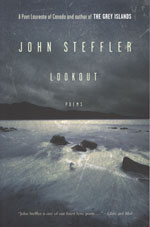
John Steffler’s latest collection, Lookout, is largely focused on and based in natural settings, paying tribute to nature, wrestling with both the enormity and the fragility of nature – nature unto itself and nature as it affects and is affected by human presence and interference. This is not your grandmother’s nature poetry, though – it dispenses with sanctimony and is not afraid of irreverence or even violence. Many poems in this collection sweep the reader through breathtaking transitions from rugged physicality and earthiness to emotional delicacy, frailty and ephemerality.
Former Canadian national poet laureate Steffler’s poems are not just acutely observant, but fully physically engaged. In fact, many of his poems quite literally meld body and landscape in startling, sometimes macabre, imaginative sequences.
Ironically, the most moving, central sequence in Lookout, Once, actually comes indoors to focus on a narrator’s wistful time with his ailing parents, which is simply and poignantly interspersed with memories from their youth and young adulthood.
Along with the recent past, the worries
and duties that kept her fixing and pleasing
are gone. Calmly she orders him to open
the curtains, find her slippers, fetch
her a small dish of strawberry ice cream.
He jokes that he has to serve her smartly
these days, and she answers flatly that she’s
done a lot of serving over the years. Without
apology she indulges her pleasures, and he
is doting and patient, almost equally changed.
… and later …
As I leave, she hugs me and
cries like a child. I have never
seen her like this. I say I’ll
be back in the early fall, and she
nods as she goes on sobbing, not
bothering to dry her face.
Upon that sad departure, it’s as if the same narrator immediately, cathartically leaps back into the natural world in the next sequence, Outside, as if that is where he personally and all of us can ultimately find solace.
Lookout is a worthy contender for the Griffin Poetry Prize, for which it is nominated this spring. Steffler offers a poetry clinic in his mastery of a range of voices and forms, with none of the sterility that a clinic or lessons or examples would suggest. From the rocks and elements to the creatures navigating them, Steffler’s poems are living, breathing, evocative beings.
